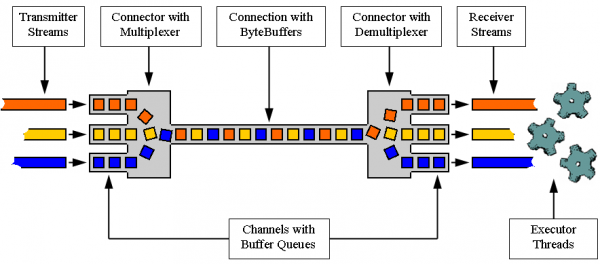Notice: this Wiki will be going read only early in 2024 and edits will no longer be possible. Please see: https://gitlab.eclipse.org/eclipsefdn/helpdesk/-/wikis/Wiki-shutdown-plan for the plan.
Difference between revisions of "Net4j"
(→Utilities) |
|||
| Line 1: | Line 1: | ||
__NOTOC__ | __NOTOC__ | ||
| − | Net4j is an extensible | + | The Net4j Signalling platform is an extensible client/server communications framework.<br> |
| − | + | Net4j eases the development of fast and maintainable application protocols that are independent<br> | |
| − | + | of the physical transport medium. Transport protocols are pluggable and Net4j ships with support<br> | |
| + | for TCP, HTTP and in-memory transport. The core of Net4j is a fast, asynchronous and non-blocking<br> | ||
| + | buffer multiplexing kernel, based on OSGi but also executable stand-alone. | ||
<br> | <br> | ||
<br> | <br> | ||
Revision as of 07:38, 8 June 2009
The Net4j Signalling platform is an extensible client/server communications framework.
Net4j eases the development of fast and maintainable application protocols that are independent
of the physical transport medium. Transport protocols are pluggable and Net4j ships with support
for TCP, HTTP and in-memory transport. The core of Net4j is a fast, asynchronous and non-blocking
buffer multiplexing kernel, based on OSGi but also executable stand-alone.
Core Features
- Extensible signalling framework for application protocols (IProtocol, SignalProtocol)
- Extensible transport framework for physical transports (IConnector, IAcceptor)
- Multiplexing of different application protocols (IChannel)
- Fast, asynchronous and non-blocking buffering kernel (IBuffer)
Transports
- NIO-based TCP transport implementation (ITCPConnector, ITCPAcceptor)
- In-process JVM transport implementation (IJVMConnector, IJVMAcceptor)
- Polling HTTP transport implementation (IHTTPConnector, IHTTPAcceptor)
Examples
- Extensible collaborations platform with buddy list, chat, fileshare, ...
- JMS(TM) provider implementation (experimental but functional)
Utilities
- Caching and monitoring framework
- Special collections
- Concurrency support
- Wiring framework (managed containers)
- Event framework
- Factory framework
- Generic finite state machine (FSM)
- I/O tools
- Lifecycle framework
- Operations and maintenance framework (OM)
- Platform abstraction (OSGi, Eclipse runtime, stand alone)
- Bundle abstraction
- Logging abstraction
- Tracing abstraction
- Preferences abstraction
- Progress monitoring framework
- Memory sensitivity framework
- Transactional and notifying registries
- Extensible security framework
- Generic transactional operations framework
- Debugging Tools
- Remote tracing (OM extension + Eclipse UI)
- Container view (Eclipse UI)
- Introspector view (Eclipse UI)
- Extensible DB abstraction framework
- Derby DB adapter implementation
- HSQLDB adapter implementation
- MySQL adapter implementation
- PostgreSQL adapter implementation

